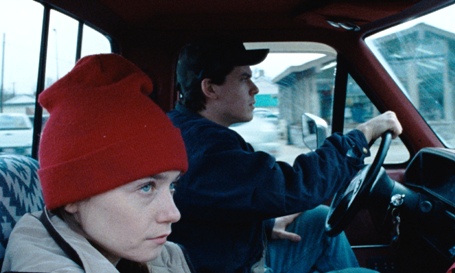 A brother and sister, their addict mother in jail, try to get by under the poverty line in a depressed southern Ohio town, and end up hanging out with some dangerous people. Out of nowhere comes this film, entitled Holler, from writer-director Nicole Riegel, and it is really something; a beautiful portrait of down-and-out working class life. It’s hard to believe this is Riegel’s debut feature; it is so strong and self-assured.
A brother and sister, their addict mother in jail, try to get by under the poverty line in a depressed southern Ohio town, and end up hanging out with some dangerous people. Out of nowhere comes this film, entitled Holler, from writer-director Nicole Riegel, and it is really something; a beautiful portrait of down-and-out working class life. It’s hard to believe this is Riegel’s debut feature; it is so strong and self-assured.
We first meet Ruth, played by Jessica Barden, as she helps her brother Blaze collect cans from dumpsters which they then sell to the local junkyard. But it’s not enough. When she gets home, there’s an eviction notice on their door, which Ruth pulls off and hides underneath a pot with all the previous ones. She’s a senior in high school whose struggle to survive makes her late for class when she actually does show up. Her older brother, played by Gus Halper, is protective. Despite their desperate situation, he’s determined that Ruth will go to college, and he is proud when she gets an acceptance letter. But his sister blows it off. She says they can’t afford tuition, but the truth is she doesn’t want to abandon Blaze, one of those guys trying to carry the world on his shoulders.
Their mom got addicted to pain pills after she injured herself at the factory, and is basically detoxing in jail. Desperate, they accept an offer from the junkyard owner to work on his crew breaking into warehouses and factories and stealing scrap metal. Copper fetches a high price, and other metals are worth good money too, so now Blaze and Ruth can make and even save some cash, but always at the risk of getting busted.
Riegel writes about what she knows—she comes from the Ohio rustbelt, and the story of Ruth trying to find a way out is largely autobiographical. The film expertly evokes the real working class world of low-paying factory and retail jobs. The time is late December, early January. It’s cold, the sky is overcast, and the light often has a bluish tinge in Holler’s frequent afternoon and evening scenes. Riegel doesn’t indulge in what has come to be called “miserablism,” however, trying to make everything seem as terrible as possible. There’s enough suffering to go around, but as in real life there are moments of closeness, humor, even joy. We meet some of their friends at the frozen foods plant, whose support for one another is a relief from the indifference of the plant owner and the local cops.
Jessica Barden, who you’d never guess is a British actress, is a winning presence as Ruth. She can be really funny with wisecracking insults, but there’s still a vulnerability there that attracts other characters, even the sleazy junkyard owner, a long-haired beer drinking tough guy dealing drugs on the side. But as you might expect, the whole business with stealing scrap metal is not as safe and secure as promised. Most of all, the underlying insecurity of life on the edge in white working class America is a constant. The corporate economic system benefitting rich people who live far away from this little town frames everything and everyone in a confining dead-end narrative. Holler doesn’t offer us glib answers or easy resolutions. Ruth’s life seems real and immediate; the environment Riegel has created around her is vivid, detailed, and honest.
This part of Ohio is actually the northern tip of the Appalachians, and “holler” is a distortion of the word “hollow,” describing a valley, and really a kind of life. Holler, the film, as it happens, also represents a shout, a cry for freedom.

A street kid fights for survival in Lebanon, in Nadine Labaki’s heart wrenching new film. Nadine Labaki is a Lebanese writer-director whose three feature...

Guillermo del Toro adds his own Gothic sensibility to this thrilling new version of an old film noir. After winning the Best Picture Oscar...

A tale of a tomb robber in Italy depicts the struggle between the quest for riches and the need for love. In Greek mythology,...